The Magic Flute

Both were riding to stardom in their day — Avi with his piano and flute, and Barak with his electric guitar — when they turned their lives around and found Torah and chassidus.
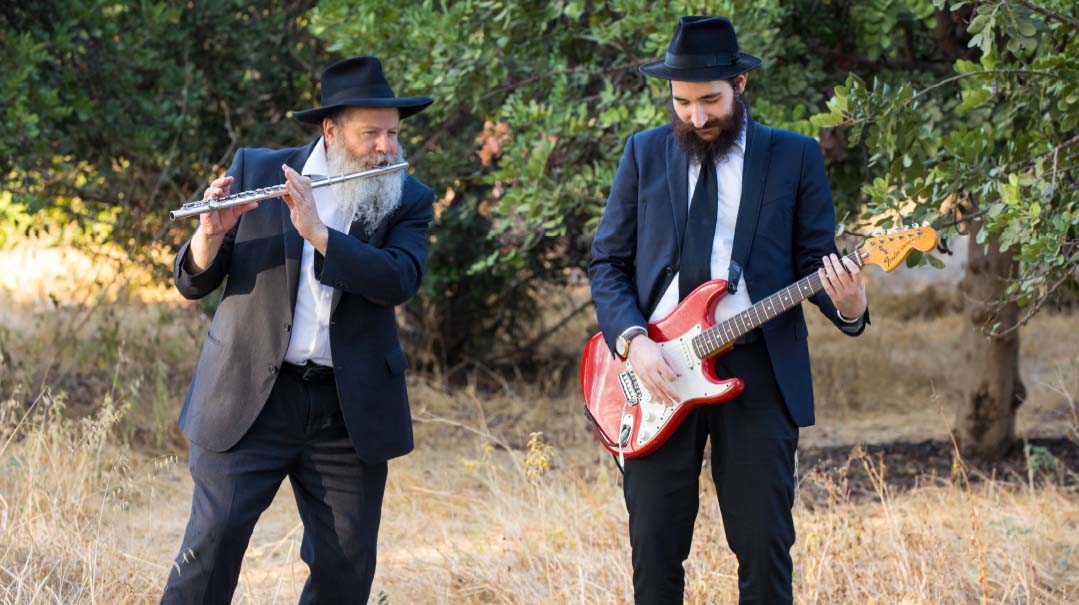
Photos: Itzik Blenitsky
While Avi Piamenta’s famous flute has been a conduit of chassidic niggunim for decades, he was surprised to learn that it was also a catalyst for bringing hard-rock Tel Aviv guitarist Barak Grossberg to teshuvah. They are a generation apart, not only by age, but by culture as well — Avi Piamenta has settled in Kfar Chabad, while Barak, who you may not have heard of if you’re not into the genre, has sanctified his heavy-metal style while making himself a religious cocoon in the heart of Tel Aviv. Yet these two musicians, today both of them Chabad chassidim, share an intertwined journey, and more.
Despite the decades between them — Avi Piamenta is in his sixties and Barak Grossberg is 29 — there’s a common narrative: Both of them were at the top of their professions when teshuvah crept into their souls, and both had to recalibrate. And so, we brought them together to share the common notes of their music and their journey through an often unforgiving industry.
For Avi, who lives in Kfar Chabad today, the fame, ensuing spiritual odyssey, and more redirected fame, was intimately tied to his brother — master guitarist Yosi Piamenta a”h, who passed away in 2015 at the relatively young age of 63. It was Yosi who, in the course of his career, created the band’s eventual signature style — rock-influenced chassidic and Israeli music with a warm, happy, and friendly message.
“Our uncle Albert Piamenta was an Israeli saxophonist who became famous for mixing Judeo-Arabic music with jazz,” Avi says. “And my mother loved music so much that the first piece of furniture she bought when we moved to Tel Aviv was a piano.”
Avi’s father was a Shin Bet agent, and for a time, the family lived on the Tzrifin military base. When the family later moved to Tel Aviv, Avi attended Hakfar Hayarok, a six-year middle school and high school that began as a socialist youth village. Avi grew up playing piano but eventually, he says, “I discovered the magical sound of the flute and that became my instrument of choice.” Music was the dominating force in his life, and when he was 17, he started performing with his brother Yosi, who’d already made a name for himself in the competitive circle of professional guitarists. Yosi was a soldier playing in the IDF band then, just as the 1973 Yom Kippur War broke out, and the brothers played for the troops on the front.
A year later, they formed the Piamenta Band and soon became crowd favorites on the secular entertainment scene, both in Israel and abroad. “Even then,” says Avi, “before we became close to the path of Torah, we still played songs like ‘Mitzvah Goreret Mitzvah’ and other songs with Jewish traditional phrases that we were familiar with. It just seemed natural to include them in our playlist. Perhaps it was in the zechut of our grandfather Avraham, who worked hard to imbue us with some tradition, even though we were pretty far from Yiddishkeit growing up.”
In 1976, the brothers got their big break when famed American saxophonist Stan Getz came to Israel as part of a European tour. He was so excited when he discovered the Piamenta brothers that he canceled all his upcoming European events and stayed in Israel to record an album with them.
Meanwhile, the Piamenta brothers became connected with music producer Shaul Grossberg, Barak’s father. At the time — “long before you were born,” he tells Barak — Grossberg was a legend in the industry, involved with the biggest names in Israeli rock of the ‘70s and ‘80s.
“He was the champion of the Israeli music world,” Avi Piamenta relates. “He could tell you every single detail about every existing group and had recordings of every artist, even those who nobody heard of. At the time, he opened a nightclub and booked us to play.”
Avi admits that they were still pretty far from Yiddishkeit, playing in Grossberg’s club with some of the most radical artists of the time, although he notes happily that “many of them became chozrim b’teshuvah later on. But then, all of us were still pretty far away.”
In 1978, for the 30th anniversary celebrations of the State of Israel, the Israeli government sent the brothers to perform at sponsored events throughout the US and Canada. Around that time, Avi had become Torah-observant, and was soon exposed to the teachings of Chabad chassidus. He decided to stay in New York to learn Torah, and even formed an informal yeshivah with other musicians. Yosi also became more religious, and eventually the whole family moved to Crown Heights.
“This was the beginning of the great change in our music,” Avi says. “We rebranded ourselves, learned the language of the chassidic niggun, and began including chassidic songs in our repertoire, developing our own unique style. At that point we wrote to the Lubavitcher Rebbe asking if we were on the right track, bringing estranged Jews back to Judaism through music and he encouraged us, giving us specific instructions in how to inspire and yet make sure there are moral fences in anindustry that has no restrictions at all.
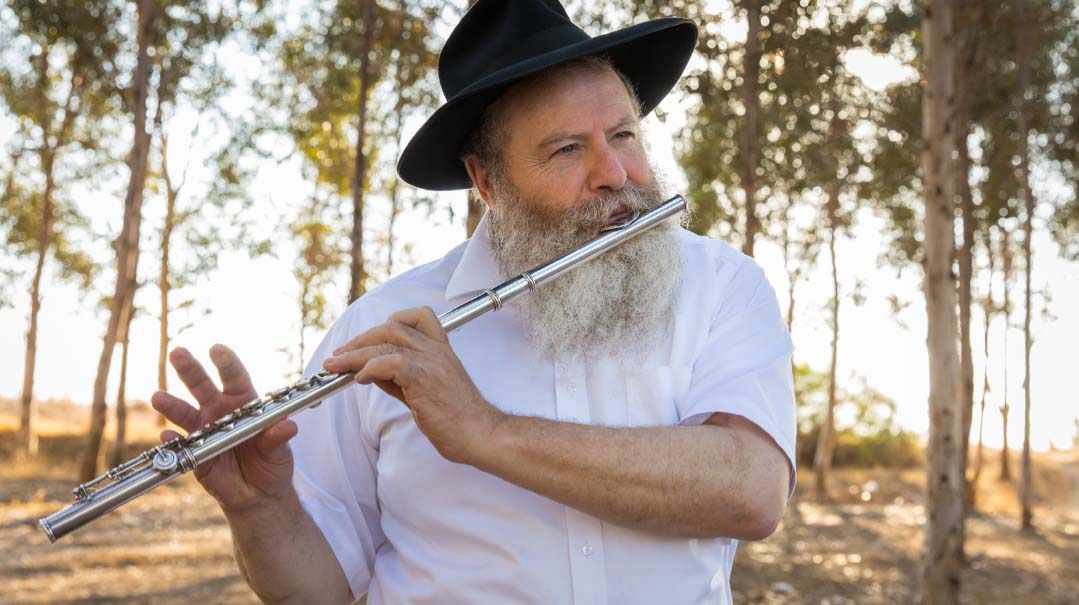
No Depth, No Truth
Barak, of course, doesn’t remember those years, but growing up in his father’s house, music was always an integral part of his life. He got hooked on guitar when he was around 12, and his father, seeing his drive and talent, sent him to study with Shlomo Mizrachi, one of the country’s top instructors. By age 15, Barak had formed his own band, was playing with leading heavy-metal rock musicians, and sang and composed as well.
He got to know the Piamenta duo a bit as well. Yosi was living in New York, but Avi was in Eretz Yisrael (how far is Kfar Chabad from Tel Aviv?) and still kept up with his old producer.
“Avi, you and Yosi wore kippot and dressed very differently from anything I was used to,” he says. “Honestly, you guys looked a bit strange to me, but you were still music greats, and that’s what spoke to me.”
Judaism, though, had no place in the Grossberg home. “My mother comes from a slightly traditional home, but my father doesn’t even have that — and nothing got passed down to us. I knew that on Yom Kippur we had to try to fast and on Pesach to taste a piece of matzah, but not much more. It’s not that I was an apikorus, a heretic, I simply knew nothing. Judaism was just never put on the table at home.”
Barak rented a studio apartment near his parents, worked a little in a music store, played gigs at night, and slept through the mornings.
“It’s the Tel Aviv lifestyle,” he says. “You’re constantly running after money, because rent is exorbitant. In the time you have left, you’re busy fulfilling your desires. That’s how the days pass, one after another, turning into month after month. I worked and played music, I made money and spent it, and then started again. Obviously though, if it would have been a great life, I wouldn’t be here now. I’d still be treading water in the swamp.
“You know,” he continues, “just when I was on top of the world, I began to feel the depression. I was immersed in the Tel Aviv entertainment scene, I played all over and I had lots of friends and fans. But at a certain point I got up in the morning and realized, I’m really not so interested in continuing to live this way.”
After two years of that negative loop, he began to look into Eastern sects; after a friend had been drawn to Buddhism, he thought that perhaps the truth lay there and registered for a course in Buddhism in the Florentine neighborhood of Tel Aviv. People sometimes ask him if he ever traveled to India, like so many secular young people do after the army.
“Anyone who lives in Tel Aviv knows that there’s no need to travel to India,” Barak says. “Whatever’s in India is in Tel Aviv as well.”
It didn’t take too many days in the course for Barak to realize that that just wasn’t it. “I didn’t find depth, and I didn’t find truth. It was pretty frustrating. I felt like I was falling into a black pit of depression, looking for something I couldn’t find — but I had no idea what it was.”
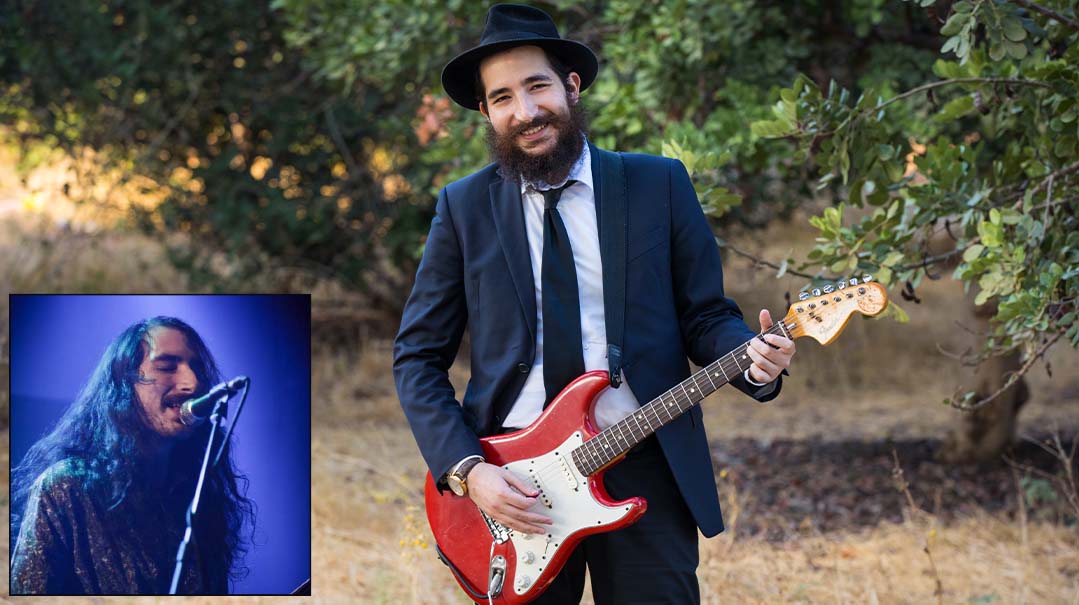
Just Turn Off Your Phone
Grossberg pauses and glances at Avi, who is listening attentively to the story. “One day, when I was sitting in my parents’ house, I suddenly heard a flute playing through the window. Within a few seconds, I recognized that it was Avi Piamenta’s song. Avi is a master, and you just can’t confuse his music with someone else’s.”
Barak leaped to the window and saw that he was right. Avi Piamenta was down the block, where there was a shul and a Chabad center, although he’d never paid attention to it before. Avi Piamenta had been invited to play for an event that night.
“I was drawn to the music,” Barak says, “but by the time I got myself together, left the house and got there, I found that Avi had just finished. He was saying goodbye and thanking the crowd for coming. But after a few minutes, it became clear that the event wasn’t yet over — everyone sat down around tables and someone came up to me and said, ‘Stay. There’s divrei Torah and food.’ I really didn’t know what to do with myself, but you know, Chabadniks have this knack for coming up to people who don’t know what to do with themselves and connecting with them.
“I wound up sitting next to someone who started talking to me about music. I thought to myself, What does he know about music, with his black hat and white shirt? But then he started dropping some names, some of the great musicians in the secular world, and we got into a two-hour conversation.
“I was very confused,” he continues. “I had this stigma about chareidim that they were close-minded, narrow, and fanatical. But I discovered, to my astonishment, that they could be nice, and even more than that — there could be dialogue between us. It was an absolute shock to me.”
The next time Grossberg visited the Chabad center was on Purim, which fell out on a Thursday. He heard the noise and the music, and found out they were celebrating with a seudah. “I saw people drinking, dancing, and having lots of fun — it seemed like a different kind of joy from the kind of partying I was used to, with everyone just getting sloshed… It looked intriguing.”
Before he left, a young man by the name of Yaron came over to him and said, “You’re invited for Shabbos.”
“I was so disconnected,” Grossberg says, “that I had no idea what he was talking about. Who was ‘Shabbos’? So I said to him, ‘Where does Shabbos live?’ He was nice enough not to laugh, and informed me, ‘Tomorrow is Friday and you’re coming to me for Shabbos.’ He gave me an address and took my phone number.
“I didn’t think he was serious, but the next afternoon, I got a phone call. ‘Where are you?’ Yaron was on the line, trying to find out why I wasn’t there yet. I told him that I wasn’t planning to come, and he said, ‘You have to. We saved a place for you.’ When I tried to decline, he insisted. ‘Take a taxi and I’m paying.’ My parents asked me where I was going — if they knew I was going to some religious people, they would have tied me to the bed. So I told them I was going to a party and would probably sleep there, and they were cool with that.
“When I got to Yaron’s house, I was happy to see that there were another few guys there, because across the hall there was an apartment of Chabadnikim, and that certainly wasn’t for me. He showed me to my bed, and told me, ‘Shabbos is coming in another few minutes.’ I asked him what that means and he said, ‘I keep Shabbos, but you can do what you want.’ I told him I had no idea what to do, and he said, ‘Just turn off your phone and it’ll be fine. Let’s go to the beit knesset and we’ll take it from there.’
“He led me to a large building, and when the door opened, I was frozen in place: About a hundred people were singing Lecha Dodi together. They were wearing black and white, which should have deterred me, but the power of their harmony melted my heart. Today I know that it was kedushah that was talking to me.”
When Lecha Dodi ended, someone pushed a siddur into Barak’s hand. “I didn’t even know which way to hold a siddur,” he admits. “I started to say excerpts from Rosh Hashanah davening.
“Afterward, Yaron said that we were going to eat. I thought that meant we’d sit down for some sushi or that he’d order pizza. But instead, we were headed across the hall to the Chabadnikim. I felt like I wanted to bolt, but then I saw how beautifully the table was set — and the food looked amazing. There was singing, words of Torah that I could barely understand, but the experience was so special that at the end I said, ‘If this is Shabbos, then from now on, I’m keeping Shabbos.’ For me, it was a decision, and when I decide something, I do it, through fire and water. And that’s how the process of keeping Shabbos began, even though I really knew nothing about how to go about it. I decided I’d play a little less, and tried not to touch my phone or computer. Every so often I’d pop into the Chabad center, which made me stronger, but I’d still go out on Friday nights with my friends, leaving my phone and wallet behind. It took about two years until I made the commitment to keep Shabbos properly. And pretty soon I was putting on a kippah in public, wore tzitzis and put on tefillin every day. But when it came to music and clubbing and Friday night action — there, I was still lost.”
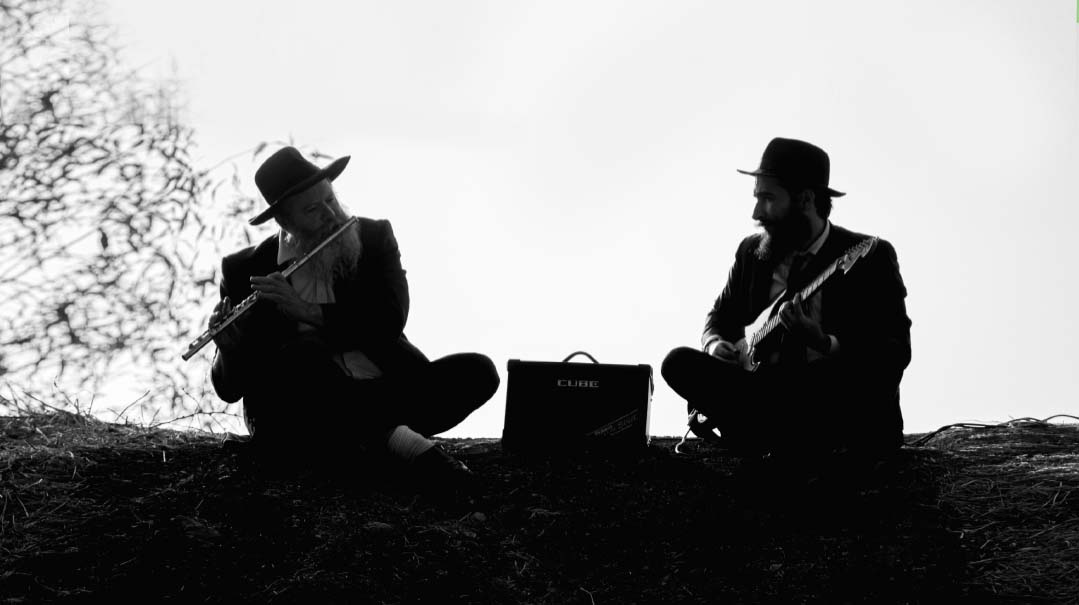
One Foot In, One Foot Out
Avi Piamenta can relate. He also experienced confusion when he set out on the path to Judaism.
“One thing I always did was put on the tefillin my grandfather had bought for me,” he says. But then I’d ask myself, ‘Who are you kidding? You don’t observe any other mitzvos.’ One day, I found a sefer someone gave me for my bar mitzvah, the Kitzur Shulchan Aruch. I opened it for the first time, and I was shocked. Suddenly I read about all sorts of things that I was obligated to do, and realized how far away I was. I closed it and told myself it’s better for me not to know, than to know and not keep anything.
“At the time, I was studying at a music academy in Tel Aviv, and I had a teacher who was chozer b’teshuvah. One day I decided to confide in him. I told him that I put on tefillin but I feel deceptive about it, and that I’m scared to learn anything because I don’t want to be obligated to keep it. Then he shared a valuable lesson: ‘If one day you think you might keep mitzvos, then you’re allowed at first only to learn it, even if you’re not observing what you learn.’
“Meanwhile, Yosi was also looking for spirituality, but for a long time, he was looking into all kinds of other religions and paths, until finally, he became exposed to Torah and left the rest behind. Yosi had a big influence on me, and in the end, we went through this process together.”
For a long time, it was one foot in both worlds. “For example,” says Avi, “I would travel to musical events on Shabbos, but I made sure not to switch the light on in the stairwell. Later, when I stopped driving, I would walk to events, but I played as usual. At the time, I had lots of questions, so for example, when I played in a restaurant that wasn’t strictly kosher, I remember wondering if I had to make a brachah on the food or not.”
Barak sighs in commiseration — although decades separate them, the challenges are all too familiar. “For me, it happened when I was invited to play at an event in an Arab restaurant,” he recalls. “I was very hungry and looked for something I could eat without too much guilt. Finally, I ate some pita with hummus. I told myself, ‘Compared to what my friends are eating here, it’s mehadrin…’”
“The truth is,” Piamenta adds thoughtfully, “in retrospect, I think HaKadosh Baruch Hu takes pleasure in these dilemmas. After all, every Jew wants to come back to Him, and sometimes the path is long and winding. When you draw closer to holiness, there will always be things that try to deter you. For me it happened when my brother and I had a string of gigs with one of the biggest producers in the country. We were supposed to play all over and we had already signed a contract. But at that time, we were starting to become more observant, and I decided I wasn’t working on Shabbos anymore. It was very uncomfortable to inform the producer, and I knew I was messing up all the members of the band, because I played the keyboard and the flute, and there was no way they could perform without me. In the end, they had no choice — we only booked for weekdays. The amazing thing was that a few months later, we found out that all the members of the band had stopped working on Shabbos.”
Barak has a similar story: “About a year after I began to keep Shabbos, I was invited to play with three of my fellow band members at a huge event that we could have only dreamed about until then. We confirmed our participation, but it turns out that they scheduled it for Shabbos. I had no choice but to tell my friends I couldn’t do it. They were devastated, because it meant they couldn’t participate either, as we only performed as a group, and this was something that could have really vaulted us forward professionally. It was also awkward for me with my father, who wanted to see me succeed in the music world, and it looked like I was shooting myself in the foot.”
Was it hard to switch your appearance and take the leap?
“It was a drawn-out process,” Barak says. “For five years, I stayed in the same place, looked the same on the outside. In my heart, I felt very close, but I continued living in my Tel Aviv studio and played with my band. I just couldn’t make the final switch. Then, a few friends advised me to travel to New York, to the Lubavitcher beis medrash, hoping that the special atmosphere there would help me resolve my personal stalemate. And you won’t believe who I met at 770 as soon as I arrived — Avi Piamenta! He seemed to pop up at crucial points in my life — he even played at my wedding a couple years later.
“When I was in Brooklyn, something in my heart melted. What I didn’t do in Israel in five years, I did there in a week. At one point, I even bought a hat and suit on Kingston Avenue, and began to dress like a Lubavitcher. One day, I met a friend, and he asked me, ‘Will you look like this when you go back to Israel?’ I replied right away that of course not, not because I’m embarrassed, but because I’m the type who flees from conflict, and had no interest in explaining to everyone why I had made these changes in my life. He told me that was just an excuse, that one’s external appearance influences a person’s internal being, and not only that, in a suit and hat, I’d become a role model for others. In the end, he convinced me.
“Still, it was a bit uncomfortable. And there was one person who I absolutely knew could not see me like this. He was a well-known fellow Tel Aviv musician, hostile to anything religious whose music is all anti-Jewish. I’d be mortified if he saw me like this. But one day, it happened. I went to get some pizza and I saw him. He came over to me, pointed to my hat and suit, and said, ‘What’s this!?’ At first, I was evasive. I wanted to say, ‘It’s not mine…’ But then I admitted the truth. And do you know what he said? ‘You’re not the only one. I’ve also been thinking about it recently…’
“I know quite a few secular musicians who are very far from Yiddishkeit, but their souls are looking for truth, and it is clear that when they are exposed to the truth in the right way, like Piamenta and I experienced, they will take it to the end. Because they are screaming for the truth and yearn for it, and they have the power to receive it and adhere to it more than anyone else.”
How did your parents react to the change?
“My mother had also begun to become stronger in her observance ,” Grossberg relates. “She’s been keeping Shabbos for a few years. To this day, my father doesn’t understand what happened to me, but I think that since I married, and have two children, he has nachas from me. We both know that in secular culture, I probably wouldn’t be married until 40, if at all.”
Are there times you still feel like you sacrificed something?
“On the contrary. I think if I’d remained secular, I’d have been swallowed up among all the other artists. It’s specifically who I am today that makes me unique. It also helps me draw others closer, because if there is a Jew who is distant from Yiddishkeit and likes my musical style, he can draw closer through it. I hope I can merit to change someone’s life this way. I admit, my music isn’t for everyone, but there are songs that also reach non-Jews around the world, and that’s a big kiddush Hashem.”
Avi Piamenta says that when he performs in front of a diverse crowd, he considers it a big shlichus. “At the same time, I need to be careful and responsible and not, chalilah, to cause anyone to fall after hearing my music and perhaps develop a taste for something that may not be part of the religious music world. This is really in line with what the Lubavitcher Rebbe told us many years ago. The Rebbe said that the kind of music people were listening to meant there was a great need for our band, but the state of the music world in general meant that we would face great challenges. So we felt a great responsibility and it meant we were always walking a fine line.”
Do you think it’s coincidental that so many musicians find their way to Yiddishkeit?
“Clearly not,” Piamenta says emphatically. “Musicians are very spiritual people. Although they have a reputation for being left-leaning, they are people with great inspiration and highly developed emotions. And I believe that any artist will tell you that when they compose songs, they feel that it really is not from them — it’s something they bring down from Above, however they interpret that. I think every talented musician has this feeling at some level, that he was granted the privilege of bringing his music into the world.”
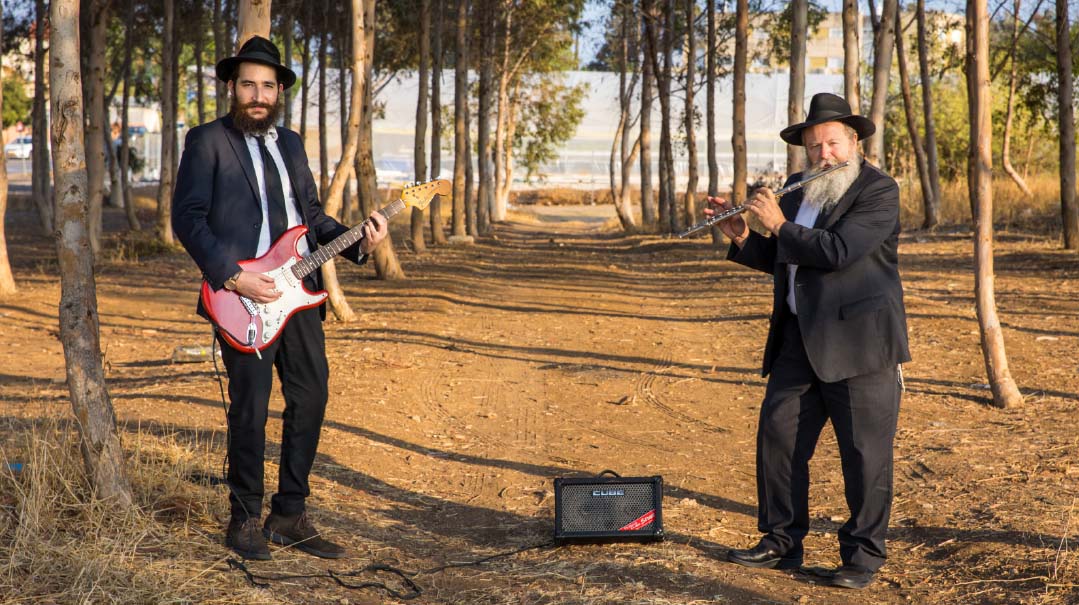
In Your Shadow
Avi Piamenta and Barak Grossberg take out their instruments, itching to play something together. But just before Piamenta’s living room explodes in a flute-and-guitar ensemble, Piamenta suddenly thunders in his trademark voice, “Wait! Before we play, we have to remember that a chassidic niggun is not just notes, it’s also a tefillah.” Then he lets his fingers dance: “Nafshi chamdah b’tzel Yadecha…” He intermittently sings and plays the traditional Chabad Anim Zemiros, as Barak Grossberg accompanies him on the guitar and their voices merge.
I look at these two artists, dressed in their chassidic garb and playing their respective instruments, one ending his journey in Kfar Chabad, the other still in the heart of Tel Aviv. Yet their story is really the same — and isn’t it the story of every Jew who reaches a particular juncture and chooses life?
(Originally featured in Mishpacha, Issue 887)
Oops! We could not locate your form.






